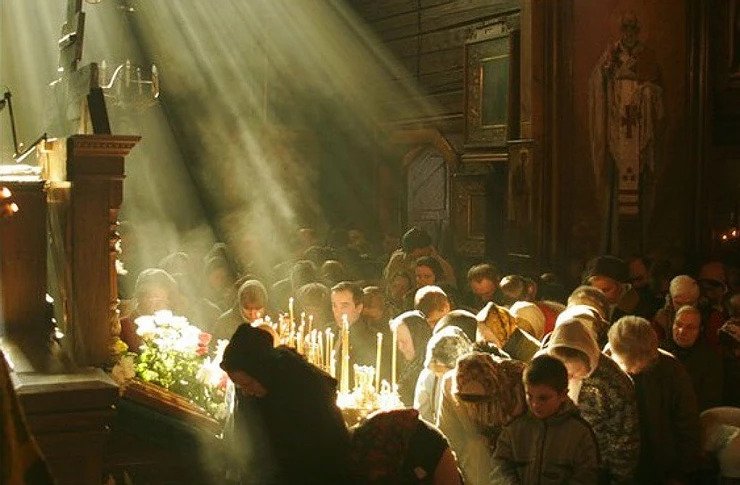Priest (silently): “Again and countless times we fall down before You, and we implore You, O Good One, Who loves mankind: That You, having regarded our prayer, may cleanse our souls and bodies from every defilement of flesh and spirit, and grant to us to stand before Your holy altar of sacrifice, free of guilt/debt and condemnation(ἀνένοχον καὶ ἀκατάκριτον). Grant also, O God, to those who pray with us, progress in life (προκοπὴν βίου), faith, and spiritual understanding (συνέσεως πνευματικῆς). Grant that they always worship You with awe and love, partake of Your Holy Mysteries without guilt/debt or condemnation (ἀνενόχως καὶ ἀκατακρίτως),and be deemed worthy of Your celestial Kingdom.” (Second Prayer of the Faithful, Byzantine Divine Liturgy)
A few moments before the choir sings the Cherubic Hymn, the priest says this prayer quietly, that we all, who “pray with” him, be granted “progress in life, faith, and spiritual understanding,” and that we partake of Holy Communion “without guilt or condemnation.” All these blessings go hand-in-hand.
Our “progress in life,” in our day-to-day, biological life, means our moving forward in our daily responsibilities, according to our “vocation” or calling from God, to serve Him and others in and from the context of our own, specific place, character (warts and all), our own background, gifts, etc., in this world. This “vocation/calling,” or voice of God in our lives is something to which we respond in our “response-abilities” (or our “abilities to respond” to God’s call), in “faith and spiritual understanding,” discerning, on a daily basis, what it is, exactly, we are supposed to be doing, and being, in our daily existence.
Part of this is partaking of Holy Communion “without guilt or condemnation.” But what “guilt” and “condemnation” are we talking about? Has not Christ already taken on all our darkness and sin, in His loving, forgiving, Self-offering on the cross? “Forgive them, Father,” He said, “for they know not what they are doing” (Lk 23: 34). Indeed, God has no “anger issues” with us; He has already forgiven us! The “guilt” and “condemnation” we’re talking about here is not His, but ours. We might carry around both “guilt” (a feeling of debt) and “condemnation” in our own attitude toward ourselves and others, whom we may not want, simply, to forgive. So it is I, not God, who blocks my communion with Him without “guilt and condemnation.” I need to forgive, both myself and others, in order to clear the way for communion with Him, and have true “progress in life.”
So let me “progress” today, in “life, faith, and spiritual understanding,” through the grace of forgiveness, which is available and on offer to me, from a forgiving, Self-offering God. “And forgive us our debts, as we forgive our debtors,” I say to Him today, because that’s all He asks of me: Forgive your “debtors,” including yourself, so you can be in sync with Me and join Me, in the forgiveness I already have for all of you.






